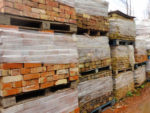Building materials can be expensive. The most expensive places to buy them are often the DIY stores where one would imagine they are cheaper! In fairness however, they are the only places where you can go any buy a bag of sand at 2pm on a Sunday afternoon. If you are a regular DIYer, using a lot of materials it is best to organise a trade account with a local builders merchants. Materials used in home improvements tend to include:

Using a mixer to mix concrete makes sure the sand cement and aggregate is well mixed
Sand – There are 3 types of sand regularly used in building. Soft sand, used for brickwork, blockwork and stonework. Sharp sand used for floor screeding, some rendering (often mixed with soft sand for this). Sharp sand has micro aggregates in it and forms a stronger mix. Silver, or play pit sand. Silver sand is very dry, fine, small particle sand used for play pits and sometimes for pointing patios.
Concrete is widely used. Concrete contains sand and aggregates, the aggregate (for normal domestic use in paths etc) is usually 10 – 15mm diameter. It is mixed with the sand and ordinary Portland cement. The following pages will show you how to work out material volumes and how to mix concrete for the job you plan.
Plaster is used a lot, especially skim plaster or to give it it’s professional name, top coat plaster. The coat underneath the skim is called base coat plaster. Another plaster often needed to fill holes or patch up old walls is called one-coat plaster but in DIY stores this is usually called patching plaster. In some areas this can be bought as renovating plaster.
Bricks, blocks, stone, path edgings, kerbs, patio slabs, concrete lintels are all usually delivered unless only buying 2 or 3 at a time. It is worth paying a small delivery charge to avoid wrecking your car.
Plumbing goods such as copper pipe, copper pipe fittings, flexible plastic plumbing pipe, rainwater drainage pipe, solder, wire wool, sink, shower, bath and basin drainage in 32mm and 40mm plastic pipe form can all be bought at a local plumbers merchants where the guy in the store will be happy to help you buy the right product. This is our main beef about DIY Stores, they never have anyone with any practical experience on the shop floor but having said that, its why DIY Doctor is here!


